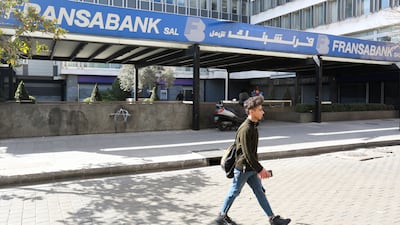Lebanon's Fransabank on Wednesday closed all of its branches in the country following a judicial order freezing its assets based on a lawsuit filed by a depositor, a Fransabank source told Reuters.
Lebanese banks have frozen most savers out of their hard currency deposits since a financial meltdown in 2019, but the controls were never formalised in law and have been challenged in courts.
The judicial order required Fransabank to reopen the account of Egyptian depositor Ayad Ibrahim and pay out his deposit in cash, or else the bank's assets would be seized, his lawyer Rami Ollaik said.
Neither the judge who issued the order nor Mr Ibrahim could be reached for comment.
The Fransabank source said, following the order, the bank would not be able to make any payments, including salaries, because its assets have been frozen. The bank has roughly 50 branches, the source said.
"We closed because the order is on all the belongings of the bank, including the safes, at the tellers, where you can get the cash. I can't get [cash], and I can't receive," the Fransabank source said.
Fransabank had issued Mr Ibrahim a cheque for the value of his deposit and he was therefore no longer a client, the source said, adding he had signed for the cheque at a notary.
A spokesperson for United For Lebanon, an anti-corruption group that is representing Mr Ibrahim in the case, said he had "signed for the cheque but with reservation".
Lebanon's banking association said that judiciary measures taken against the top local lenders would "topple the banking sector".






